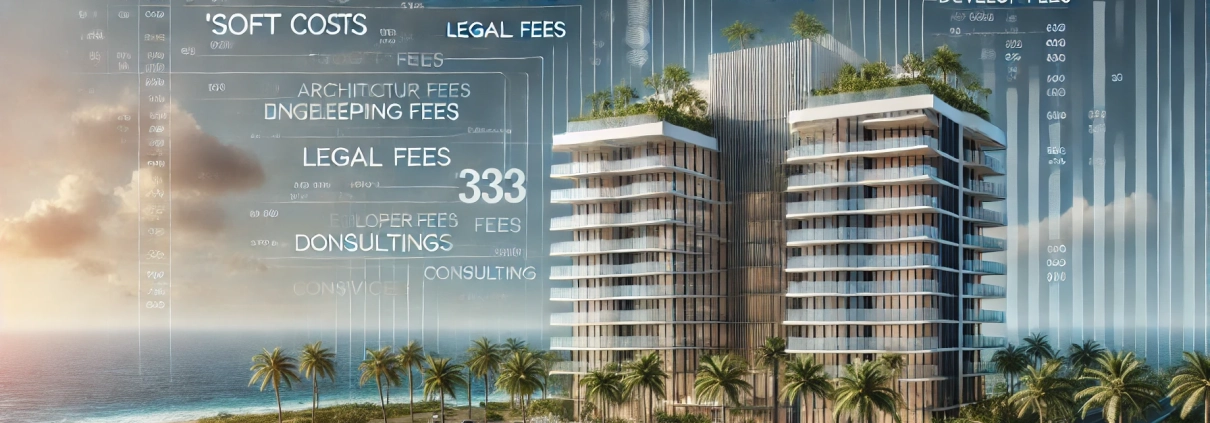Soft Costs
Any indirect development costs (i.e. not labor or materials). These costs range from architecture and engineering fees to project management and developer fees and can affect hard costs significantly (e.g. an architect’s efficient building design may reduce the need for structured parking hard costs). Soft Costs are also referred to as Indirect Costs.
Putting ‘Soft Costs’ in Context
Introduction
Seaside Development Group, LLC is a real estate developer specializing in luxury coastal residential projects. The company is currently developing a 15-story, 40-unit high-end condominium project called The Azure Residences, located on the beachfront of Fort Lauderdale, Florida. The project is designed to cater to high-net-worth buyers seeking oceanfront living with modern amenities and bespoke finishes.
Overview of Soft Costs
In the context of this development, soft costs refer to the indirect costs required to design, plan, and manage the construction of The Azure Residences. Unlike hard costs, which are the direct costs of labor and materials, soft costs are essential expenditures that facilitate the successful completion of the project. These costs are incurred before and during the construction phase but do not directly contribute to the physical building itself.
Breakdown of Key Soft Costs
For The Azure Residences, the key soft costs include the following categories:
- Architectural and Design Fees: Seaside Development hired a renowned architectural firm to create a unique, modern design for the building. The architectural firm charged a fixed fee of $2.5 million for conceptual design, construction documents, and permit coordination.
- Engineering Fees: Structural, mechanical, electrical, and plumbing (MEP) engineers were contracted to ensure the building met all local code requirements and hurricane resilience standards. These engineering fees totaled approximately $1.2 million.
- Legal and Permitting Fees: The process of obtaining zoning approvals, building permits, and environmental clearances required legal assistance and filings with the city of Fort Lauderdale. Legal and permitting fees totaled $600,000 for the project.
- Developer Fee: As the sponsor and lead developer, Seaside Development Group allocated a 4% developer fee on the total project cost. With a total project budget of $80 million, the developer fee equated to $3.2 million.
- Consulting and Professional Services: Market studies, appraisals, and project management services were required to guide the project from conception to completion. These professional fees amounted to $500,000.
- Insurance and Financing Fees: Prior to construction, Seaside Development was required to pay for builder’s risk insurance and secure a construction loan. The upfront costs associated with insurance premiums, loan origination fees, and lender-required third-party reports totaled $900,000.
How Soft Costs Impact the Total Development Budget
For The Azure Residences, the total soft costs amounted to approximately $8.9 million. Given the total development budget of $80 million, soft costs represent approximately 11% of the total project cost. While this percentage may seem significant, soft costs are critical to ensuring the project is properly designed, approved, and managed through completion.
Example of How Soft Costs Affect Hard Costs
One specific example is the impact of architectural design on hard costs. The architectural firm proposed a cantilevered design for balconies that required fewer support columns. While this increased architectural fees slightly, it reduced the need for concrete and steel, lowering overall hard costs. In this way, the initial increase in architectural soft costs resulted in long-term savings on hard costs.
Conclusion
The development of The Azure Residences by Seaside Development Group illustrates how soft costs play a critical role in the overall financial and operational success of a real estate development project. From architectural fees that influence the efficiency of construction to developer fees that compensate sponsors for risk, soft costs are a necessary component of the development process. These costs must be carefully managed to ensure that the project’s budget remains on track while still achieving a high standard of design and construction.
Frequently Asked Questions about Soft Costs
What are soft costs in real estate development?
Soft costs are indirect development costs that are not tied to labor or materials. They include architecture and engineering fees, permitting, legal, developer fees, insurance, and other professional services.
How do soft costs differ from hard costs?
Hard costs are the direct physical costs of construction (e.g., labor, concrete, steel), while soft costs are indirect and support the planning, design, and management of the project.
What are examples of soft costs in The Azure Residences project?
Examples include:
$2.5M in architectural fees
$1.2M in engineering fees
$600K in legal and permitting
$3.2M developer fee (4% of $80M budget)
$500K in consulting and project management
$900K in insurance and loan fees
How much did soft costs represent as a percentage of the total project budget?
In The Azure Residences case, total soft costs were $8.9 million, or approximately 11% of the $80 million total development budget.
Can soft costs influence hard costs?
Yes. For example, a cantilevered balcony design increased architectural fees but reduced the need for support columns—lowering structural hard costs, demonstrating how efficient soft cost investments can yield hard cost savings.
Why are soft costs critical to a development project’s success?
Soft costs ensure the project is properly designed, permitted, financed, and managed. They are essential for aligning the project with regulatory standards and the developer’s goals, reducing long-term risks.
Are soft costs the same as indirect costs?
Yes. Soft costs are also referred to as indirect costs, as they support but do not directly result in the construction of the physical building.
Where can I download the full CRE Glossary?
You can download the complete CRE Glossary in an eBook (PDF) format by clicking the link provided in the related content section.
Click here to get this CRE Glossary in an eBook (PDF) format.

